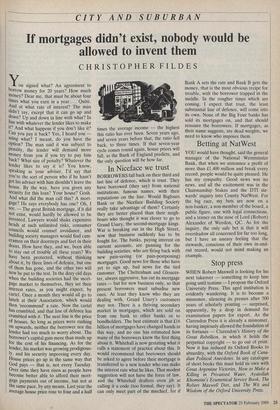In Niceface we trust
BORROWERS fall back on their third and last line of defence, which is trust. They have borrowed (they say) from national institutions, famous names, with their reputations on the line. Would Bigfours Bank or the Niceface Building Society really take advantage of them? Certainly they are better placed than their neigh- bours who thought it was clever to go to Grand Usury, the second-mortgage kings. War is breaking out in the High Street, now that business suddenly has to be fought for. The banks, paying interest on current accounts, are gunning for the building societies, who are firing back with new pain-saving (or pain-postponing) mortgages. Good news for those who have yet to sign up, bad news for the tied customer. The Cheltenham and Glouces- ter, always aggressive, has cut its mortgage rates — but for new business only, so that present borrowers must subsidise new ones. At least they know who they are dealing with. Grand Usury's customers may not. There is a thriving secondary market in mortgages, which are sold on from one bank to other banks or to bondholders. The best estimate is that £16 billion of mortgages have changed hands in this way, and no one has estimated how many of the borrowers know the first thing about it. Whitehall is now gestating what it calls a statement of practice about this. It would recommend that borrowers should be asked to agree before their mortgage is transferred to a new lender who can make the interest rate what he likes. That modest suggestion will not have the force of law, and the Whitehall drafters even jib at calling it a code (too formal, they say). It can only meet part of the mischief, for if Bank A sets the rate and Bank B gets the money, that is the most obvious recipe for trouble, with the borrower trapped in the middle. In the rougher times which are coming, I expect that trust, the least substantial line of defence, will come into its own. None of the Big Four banks has sold its mortgages on, and that should reassure the borrowers. If mortgages, as their name suggests, are dead weights, we need to know who imposes them.
















































 Previous page
Previous page